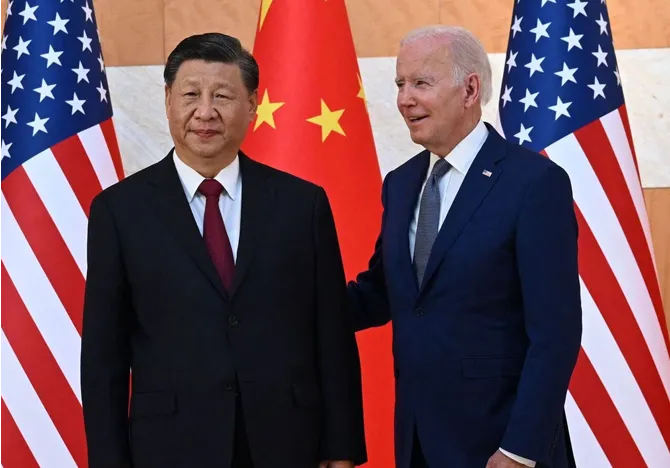-
CENTRES
Progammes & Centres
Location
Beijing is not doing as well as it would like us to think. Its economic challenges and isolation have meant it is keener than its put-off partners to achieve some normalcy in ties with other countries.

If recent diplomatic activities are to be believed, China is bouncing back from the wilderness as more and more major actors on the world stage try to reset their engagement with Beijing. It has been a disastrous few years for Chinese diplomacy and most of it has been of its own making. The arrogance displayed at the strategic level, coupled with its ‘wolf warrior’ diplomacy of recent times, almost destroyed the narrative of China’s peaceful rise. As Chinese President Xi Jinping centralized power and shunned the sagacity of his predecessors on playing it lightly on the global stage, he emerged in much of the world as a global villain, even beating his close follower, the North Korean dictator, Kim Jong-un.
The world pushed back against Chinese assertiveness, especially as the covid outbreak and its aftermath also shattered the myth of the much-vaunted Chinese model of governance. The US, Europe and key players in the Indo-Pacific found their voice in challenging Beijing’s domineering attitude. With a geo-strategic focus on the Indo-Pacific galvanizing global politics, China has had to contend with significant powers showcasing their desire to shape the regional strategic landscape. The very concept of the ‘Indo-Pacific’ became a zone of contestation with China resisting the rest of the world’s attempt to frame this broad region as central to the effort of opposing Beijing’s hegemony.
Today, however, a gradual easing of that contestation might be visible. Britain’s new foreign secretary, David Cameron, has suggested that though he supported the Rishi Sunak government’s current “realistic, hard-headed policy" towards China, it is still right to “engage" with Beijing as China is key to solving big issues like climate change. Earlier this month, Anthony Albanese became the first Australian prime minister to visit China in seven years. Japanese Prime Minister Fumio Kishida met the Chinese President along the sidelines of the Asia-Pacific Economic Cooperation (APEC) summit in San Francisco, where they tried to “focus on common interests" and reaffirm a “strategic relationship of mutual benefit and give it new meaning." And then, the foreign ministers of Japan, China and South Korea held their first in-person talks in more than four years recently, focusing on Northeast Asian stability.
As a signal moment for a watching world, there was the highly anticipated summit between the US President Joe Biden and Xi Jinping that led to the two leaders agreeing to open a presidential hotline, resume military-to-military communication, and work together to combat the flow of fentanyl and the ingredients of this addictive drug into the US, which is facing a domestic addiction crisis. Bilateral ties between the two powers had fallen so low that the summit was an attempt to bring a semblance of normalcy to the Washington-Beijing relationship. The summit, in more ways than one, was therefore symbolic, and symbols matter in great power diplomacy.
This reset is important for Xi Jinping as China’s economic challenges show no sign of abating and Xi’s own reputation as an effective manager has gone for a toss, with a post-pandemic economic recovery still just a mirage at this stage. The Chinese state media, therefore, went overboard in describing the outcome of the Xi-Biden summit as “historic" and the dialogue as “new starting point" in bilateral ties. This, despite the fact that Biden once again described the Chinese leader as a “dictator" and pointedly underlined America’s backing for a free and open Indo-Pacific.
The same is true of other such recent engagements, where despite all the excitement, things have quickly fallen back to old despondency. Japan-China summitry has also failed to achieve much, with Tokyo reiterating its call for peace and stability in the Taiwan Strait as well as a scientific reassessment by Beijing of its ongoing ban on Japanese seafood.
Last week, Australia accused a Chinese warship of “unsafe and unprofessional" actions after it emitted dangerous sonar pulses in international waters, thereby risking the safety of Australian divers. In the UK, David Cameron recognizes that this is not the China that he was used to dealing with as the British Prime Minister. He has acknowledged that “China has become much more aggressive, much more assertive, over the Uighurs, over Hong Kong, the ‘wolf warrior’ diplomacy." This means that London will have “to align more carefully with our allies to make sure we can counter any malign threats coming from China."
For all the hype around the new global outreach towards China, it is Beijing that is more keen on this renewed engagement. It wants to woo capital from its key economic partners and is keen to signal a thaw in its bilateral ties with them. But the world too has learnt its lessons and is now drawing new red lines for Chinese behaviour.
If trust-based partnerships are the new norm, globally, then China continues to remain an outlier, and it is unlikely that a few highly publicized summits will rebuild that much-needed political trust. New Delhi, too, has drawn its red lines vis-à-vis China after the Galwan crisis in 2020, and in some ways has shown the world an effective template of how to manage an aggressive China. Given India’s own rise in the global hierarchy, while carefully assessing shifts in the global order and locating opportunities therein, New Delhi will have to set its own terms of engagement with Beijing.
This commentary originally appeared in Mint.
The views expressed above belong to the author(s). ORF research and analyses now available on Telegram! Click here to access our curated content — blogs, longforms and interviews.

Professor Harsh V. Pant is Vice President – Studies and Foreign Policy at Observer Research Foundation, New Delhi. He is a Professor of International Relations ...
Read More +